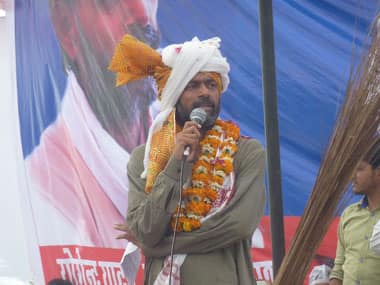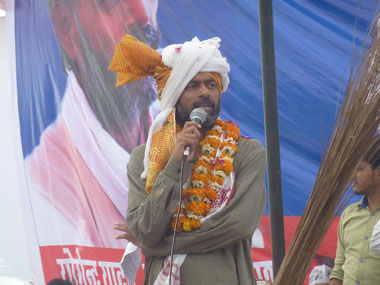As PM Narendra Modi’s staunchest rivals cheered Aam Aadmi Party on from the ring, the latter decided to play the adulation down and caution them that Brand Modi is not a spent force yet. As Modi-hater and Chief Minister of West Bengal Mamata Banerjee felicitated Kejriwal and AAP on Twitter, Yogendra Yadav said during a panel discussion on NDTV that the Delhi election results are not in any way, indication of the fact that Modi doesn’t hold sway over voters in states like Uttar Pradesh and Bihar. “I do not agree with opposition leaders who are becoming smug and think that this means that BJP will lose in Bihar and Uttar Pradesh. Modi has not lost his popularity and it would be completely wrong to think that,” he told NDTV. He argued that that the assumption that the AAP win was more Delhi retorting to BJP, was wrong, saying that Delhi had voted for the Aam Aadmi Party because they had not let the voter out of sight and done intensive groundwork - from meeting voters door-to-door to assuring them that they have their act together this time. [caption id=“attachment_2090075” align=“alignleft” width=“380”]
 Yogendra Yadav.[/caption] One has to agree with Yadav. Delhi was never a BJP stronghold in the first place, with the 2013 elections leading BJP and AAP to victory on an anti-Congress vote, rather than a pro-BJP one. Secondly, the AAP had gotten everything from symbolism to temper right this time, playing the much abused victim with elan. If ‘Ab Ki Bar, Modi sarkar’ was the perfect catchphrase to carry BJP to victory in the general elections last year, ‘Paanch saal Kejriwal" was perfectly timed for this election and a well-grounded tagline. Accused of being a ‘bhagora’ and ‘AK-49’, thanks to his last stint as the CM, ‘Paanch Saal Kejriwal’ came with the promise that the AAP party chief has learnt from his mistakes and is willing to stick around. Yadav also added that Narendra Modi was losing sight of the sophistication demanded of a Prime Minister, and him resorting to abusing Kejriwal and AAP in the worst possible ways also worked in the benefit of AAP. However, like Yadav pointed out, other states shouldn’t get giddy following AAP’s success in Delhi. Mostly because the voting demographic of Delhi and other states are vastly different. Delhi is more cosmopolitan with a fair share of urban voters. It can be safely assumed that a large chunk of Delhi’s voters are bound to be offended by the offensive Hindutav rhetoric which seems to be on a popularity curve following the BJP’s ascension to power. Some of them might have also noticed how the BJP and Narendra Modi has kept eerily calm on the Hindutva forces on a romp at present. They are also the kind of voter to analyse the promises made by Modi as opposed to the ones delivered in the past months he has been in power. The average Delhi voter is not same as the average voter in a West Bengal or Bihar. The political alternatives to BJP in these states come with the same mothballed appeal of pots-calling-kettles-black and have been guilty of practicing the same divisive politics it accuses BJP of indulging in. For example, Mamata cannot stop pandering to the Muslim population in the state, and neither will the political parties in Uttar Pradesh and Bihar. Then again, the leaders of these parties - SP, JD(U), TMC - are all considered as chips off the old political block, like the BJP leaders themselves. They practice the same old school caste, religion specific politics. Basically, the political rhetoric of these parties and that of the BJP is basically indistinguishable. Also, AAP, unlike say a TMC, comes without its share of corruption-related controversies. Therefore, it is not safe to claim that Modi will cease to be a cult personality in the rest of India. Because, like it has been proved in the past, Modi plays himself better than most of his political clones.
Yogendra Yadav.[/caption] One has to agree with Yadav. Delhi was never a BJP stronghold in the first place, with the 2013 elections leading BJP and AAP to victory on an anti-Congress vote, rather than a pro-BJP one. Secondly, the AAP had gotten everything from symbolism to temper right this time, playing the much abused victim with elan. If ‘Ab Ki Bar, Modi sarkar’ was the perfect catchphrase to carry BJP to victory in the general elections last year, ‘Paanch saal Kejriwal" was perfectly timed for this election and a well-grounded tagline. Accused of being a ‘bhagora’ and ‘AK-49’, thanks to his last stint as the CM, ‘Paanch Saal Kejriwal’ came with the promise that the AAP party chief has learnt from his mistakes and is willing to stick around. Yadav also added that Narendra Modi was losing sight of the sophistication demanded of a Prime Minister, and him resorting to abusing Kejriwal and AAP in the worst possible ways also worked in the benefit of AAP. However, like Yadav pointed out, other states shouldn’t get giddy following AAP’s success in Delhi. Mostly because the voting demographic of Delhi and other states are vastly different. Delhi is more cosmopolitan with a fair share of urban voters. It can be safely assumed that a large chunk of Delhi’s voters are bound to be offended by the offensive Hindutav rhetoric which seems to be on a popularity curve following the BJP’s ascension to power. Some of them might have also noticed how the BJP and Narendra Modi has kept eerily calm on the Hindutva forces on a romp at present. They are also the kind of voter to analyse the promises made by Modi as opposed to the ones delivered in the past months he has been in power. The average Delhi voter is not same as the average voter in a West Bengal or Bihar. The political alternatives to BJP in these states come with the same mothballed appeal of pots-calling-kettles-black and have been guilty of practicing the same divisive politics it accuses BJP of indulging in. For example, Mamata cannot stop pandering to the Muslim population in the state, and neither will the political parties in Uttar Pradesh and Bihar. Then again, the leaders of these parties - SP, JD(U), TMC - are all considered as chips off the old political block, like the BJP leaders themselves. They practice the same old school caste, religion specific politics. Basically, the political rhetoric of these parties and that of the BJP is basically indistinguishable. Also, AAP, unlike say a TMC, comes without its share of corruption-related controversies. Therefore, it is not safe to claim that Modi will cease to be a cult personality in the rest of India. Because, like it has been proved in the past, Modi plays himself better than most of his political clones.
Yogendra Yadav is right, after AAP win, other states will write off PM Modi at their peril
Piyasree Dasgupta
• February 10, 2015, 15:23:00 IST
As PM Narendra Modi’s staunchest rivals cheered Aam Aadmi Party on from the ring, the latter decided to play the adulation down and caution them that Brand Modi is not a spent force yet.
Advertisement
)
End of Article